Experiences of Migration in Classical Antiquity
Undergraduate Research Assistant Holly Axford has been researching ancient narratives of displacement. In this blog she writes about ancient attitudes to supplication and hospitality, and how class and gender impacted on ancient experiences of migration and forced displacement.
Individuals and groups in the ancient world left their native lands and sought shelter elsewhere, either temporarily or to establish a permanent home, for a number of reasons: changing economic circumstances, political exile, or (very frequently) conflict. But what kinds of reception did these displaced peoples receive when arriving in another community across the ancient Greek and Roman worlds? The well-known institution of xenia, or ‘guest-friendship’, as well as the divine protection traditionally extended to suppliants in ancient Greek religious thought, could lead us to believe that displaced peoples were guaranteed a hospitable welcome. In this blog post, I will explore the figure of the suppliant and this notion of hospitality in more depth, before going on to consider how other factors – namely, class and gender – are depicted in ancient narratives of displacement, and how they may have shaped the experiences of the displaced.
Supplication in the Ancient World
Closely embedded in the social and cultural framework of ancient Greece were the rights of the suppliant and, related to this, the proper welcome to be offered to the stranger, or xenos. The physical act of supplication, which is described in a number of episodes from epic, involves the suppliant lowering themselves and grasping the knees of another in a manner which served as a symbol of their vulnerability. It is noticeable, however, that this ritual of action and entreaty is not always performed in its entirety. Odysseus, in his meeting with the Phaeacian princess Nausicaa in book six of The Odyssey, decides that, given his present state of undress, it would be inappropriate to approach her, and instead supplicates her verbally from a respectful distance. John Gould, on the other hand, stresses the importance of the physical act of supplication, arguing that when a suppliant does not do it in full, their request tends to be rejected.[i]In battle scenes in The Iliad, for example, whenthe suppliant either breaks contact or is unable to complete the ritual fully, he is often killed by his opponent.[ii]
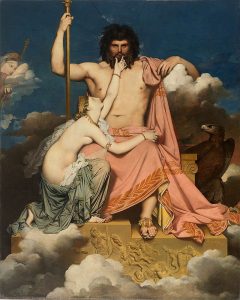
Jean Auguste Dominique Ingres
As these Iliadic examples demonstrate, there are times when the rights of a suppliant were not respected. However, the suppliant was thought to be placed under the protection of Zeus. In Aeschylus’ play, Suppliants, Pelasgus of Argos is encouraged to look favourably on the Danaids’ entreaty by his recollection that ‘the wrath of Zeus who protects suppliants is heavy indeed’ (347).[iii] Repeated references such as this one to the role of Zeus in ensuring the safety of suppliants, in addition to the ultimate success of the Danaids’ appeal, seem to point towards the acceptance of displaced outsiders as part of a wider value system to which individuals and communities were expected to conform.[iv]
In accordance with the vulnerability embodied by the physical ritual of supplication, the speech of the Danaids in the play appears to depict them as passive victims. As their father Danaus warns them: ‘Remember also to defer: you are in need, a stranger, a fugitive. Bold words do not suit weaker persons’ (201-202). Reflecting on this aspect of the play, Elena Isayev has highlighted similar issues with modern media representations of refugees. To win the sympathy of readers and viewers, modern media often chooses to emphasise the helplessness and passivity of refugees and, in doing so, effectively denies them any personal agency.[v] The characterisation of the Danaids, however, is not so straightforward as it first appears. It is possible, following Isayev’s interpretation, to recognise in their story the agency – and not just the vulnerability – of suppliants.[vi] The chorus invites Pelasgus to do as follows:
‘And see me, your suppliant here, and in flight,
Running about like a heifer pursued by wolves,
High up amid steeping crags, where trustful of his aid
She lows to tell the herdsman of her plight’ (350-353)
While characterising themselves as prey, the chorus of Danaids positions Pelasgus alongside the paternal figure of the herdsman, implicitly reminding him of his responsibility towards them. Their speech here recalls wider ancient thought, in which the imagery of shepherding served as an important symbol of guidance and protection (its deployment in later Christian parables being a key example of this). In their appeal to Pelasgus, the Danaids proactively utilise their vulnerability to illustrate the distinction between their present social position and his own, highlighting his obligations within this moral and religious framework and working to shape his attitude and actions towards them. The (perceived and actual) vulnerability of the Danaids as suppliants and as migrants, then, in some ways enables the exercise of agency by granting them a position within an existing social system, whereby they have the right to appeal for certain protections. Yet at the same time, it constrains their agency by restricting them to a predefined identity as victims within this system. Rarely, in the ancient world or the modern, do we hear the voices of migrants themselves. It is therefore striking that here, the Danaids’ representation of themselves goes some way towards collapsing the categories of agent and victim – but with agency restricted to voicing their victimhood and reminding others of their social responsibilities to such victims.
This same flexibility is often absent from modern representations of displaced peoples. One need only look to the image of ‘women and children’ in modern media, as a homogenous and largely voiceless group in need of the state’s protection.[vii] Women, included in this group on the basis of being children’s carers, come to share this supposed identity of passive vulnerability, characterised often as needing people to speak for them as well as support them in other ways. On the other hand, single men (as well as single women, who are especially vulnerable to sexual exploitation) are often not depicted with the same degree of sympathy and cannot expect the same levels of advocacy from others.[viii] These different social identities, and the varying degrees of agency and expected independence which they entail, help to construct categories of ‘undeserving trespassers versus those who deserve rights and care from the state’.[ix] All too frequently, modern depictions perpetuate a binary set of identities in which vulnerability presupposes a lack of agency, and in which a degree of agency erases an obligation of support. Aeschylus’ Danaids point towards a different kind of representation, where these two categories are not so fixed.
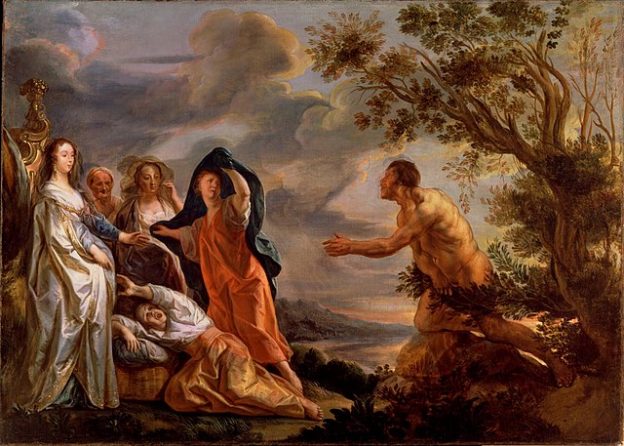
The ritual of supplication, and of guest-friendship, and a community or individual’s response to it was also central to the construction of identity. Odysseus, the ancient world’s most famous wanderer, arrives as a stranger in a number of foreign lands, and the welcome he receives in each place is used to reflect the geographical extremity of his journey. The Cyclops Polyphemus, when called upon by Odysseus to offer the expected forms of hospitality, declares ‘my people think nothing of that Zeus with his big sceptre, nor any god’ (9.274-276), and goes on to wholly invert the system of xenia set out elsewhere in the poem by eating his guests.[x] Arete and Alcinous, on the other hand, offer an exemplary response to Odysseus’ supplication, even going so far as to berate Nausicaa for not bringing him immediately to the palace (7.298-301). Their hospitality, in contrast to the barbarity of the cyclopes, acts as a mark of Odysseus’ return to civilisation and offers a bridge between the extraordinary events of his travels and the familiar world of Ithaca.
Here, the acceptance of suppliants and strangers appears as the sign of a refined and prosperous community. This was not, it seems, restricted to the world of epic. In a speech of Isocrates, a group of Plataeans turn to Athens for aid after being driven from their home by the Thebans. They claim that an offer of support from the Athenians could ‘cause all the world to regard you as the most scrupulous and most just of all the Greeks’ (14.2).[xi] While indicating that being seen to offer shelter to the displaced could contribute positively to a community’s wider image and reputation, the Plataeans’ reference to this here also suggests that they believed this to be an effective and successful argument to win over the Athenians. We might assume, therefore, that the listeners of this speech would wish to see themselves as protectors of the displaced, and to be seen that way by others.[xii]
All of this points towards an optimistic view that the safety of the displaced and their right to be accepted was guaranteed by communities or individuals who either feared offending divine protectors, or who wished to be viewed by others as generous hosts (or, perhaps, a combination of the two). Yet it is true that, as with all literary depictions, such examples may be reflective of a cultural ideal rather than an everyday reality.[xiii] Other factors came into play when displaced peoples sought the assistance of others.
The Impact of Social Status
Class and social status were vital, not only to the kind of reception a displaced person was likely to receive, but also in determining whose narratives were told and preserved. In Euripides’ Phoenician Women, Jocasta, wife of Oedipus, questions her exiled son Polyneices about his experiences. She asks whether he received any assistance from his father’s friends, to which Polyneices replies that ‘poverty is a curse; breeding did not find me food’ (402-405).[xiv] The importance of wealth and resources to the security of an exiled or displaced person is made clear here. We can extrapolate that, without such wealth and elite social connections, the prospects for a displaced person in a foreign land would be slim.
Social status can also be identified in the ability of Odysseus to be well-received by strangers. One scholar has suggested that the hospitality shown to him by the Phaeacians, despite his ragged appearance, is ‘one among many signs that he has ventured into fairyland’.[xv] A view such as this seems to firmly support the idea that wealth and social status were vital to the prospects of a stranger or suppliant. It is held to be surprising that, without them, one would be offered shelter and aid. To some extent, however, this is undermined by the rest of the text. Alcinous claims that the Phaeacians always provide travellers with safe passage home (8.33-34) without any reference to their status or ability to reciprocate, suggesting that this behaviour was embedded in a wider moral framework like that discussed above. Yet, we as the audience are aware of Odysseus’ elite status and of the wealth which he possesses in Ithaca. He is, we know, more than equal to the Phaeacians’ hospitality. It may therefore be more fitting to see this episode as an important marker in Odysseus’ journey. The Phaeacians’ welcome functions as a recognition of his real status and facilitates his return to the ordered and familiar world of Ithaca. His status, when he arrives, is that of a displaced wanderer, but the hospitality which he is offered serves to restore him to an identity which he held prior to this displacement. This is an important reminder that The Odyssey, as a narrative of migration, is not necessarily about migrants or migration. Instead, Odysseus’ status as a migrant is just one part of a wider narrative arc. As is the case with the varying responses of his hosts raised in the previous section of this blog, discussions of migration are used to discuss the familiar world of the home, and to define its own identity against that of the ‘other’.
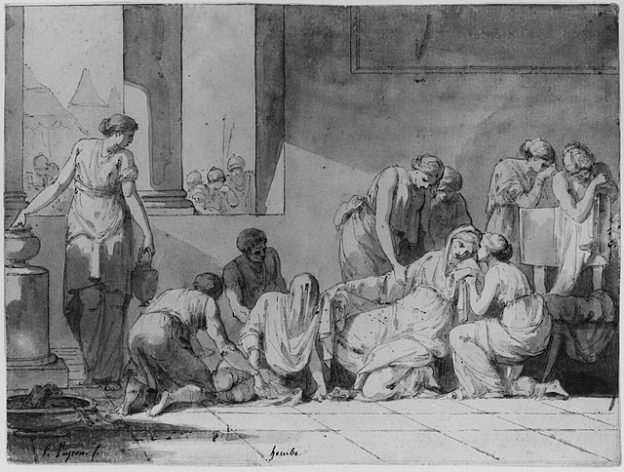
In another blog post, I examined how the displacement of female prisoners of war following the Trojan War was narrated by ancient texts. What stood out in these accounts is that much of their pathos stems from their subjects’ dramatic change in circumstances, from Trojan royalty to slaves of the Greek victors. Hecabe, for example, refers to herself with a moving contrast as ‘the woman who once strode so proudly through Troy but is now reduced to slavery’ (505-506).[xvi] Almost exclusively, these are the narratives of the elite and privileged. Andromache’s maid, in Euripides’ Andromache, recalls ‘the days we lived at Troy’ (58), in a brief acknowledgement of their shared displacement, but for the most part, the stories which were told were those concerning women from among the social elite. Not only, then, did social status grant displaced individuals a degree of protection. The ability to share experiences, and to have those experiences be acknowledged and reflected upon by others, was also influenced by issues of class. Those occupying a lower social position, like Andromache’s maidservant, lacked the ability to give a permanent and lasting account of their own.[xvii]
It is possible to recognise some unfortunate similarities with modern media representations of displacement. Terence Wright has noted that, for a number of reasons including a possible lack of security, or language barriers, refugees and displaced peoples today may be poorly positioned to challenge and correct media representations of themselves, or to offer a direct account of their own.[xviii] Recognising those who are absent from ancient narratives of displacement, therefore, is one way of helping to address our own issues of representation.
Gender and the Experiences of Suppliants and Migrants
One’s social status was not the only factor which might have shaped experiences of displacement in the ancient world. Under a set of heavily patriarchal social norms, gender was also essential in governing how a displaced person could engage with a host community. One prominent example of this can be found in Euripides’ Medea. Abandoning her native land of Colchis, Medea settles in Corinth with Jason after his quest to retrieve the Golden Fleece. However, Jason then deserts her to wed the daughter of Creon, king of Corinth. Medea poignantly underlines her isolation:
‘But what of me? Abandoned, homeless, I am a cruel husband’s plaything, the plunder he brought back from a foreign land, with no mother to turn to, no brother or kinsman to rescue me from this sea of troubles and give me shelter’ (255-259) [xix]
Medea, of course, is a uniquely driven and resourceful character, who does not allow herself to become a victim of the men around her. Nonetheless, this situation perfectly encapsulates the way in which gender norms could influence the experiences of a displaced person. It is clear from this quotation that Medea, without Jason, is left stranded in Corinth. Her departure from Colchis has led to her removal from familial networks of support, of which her husband is now the only source. Medea’s connection to the city of Corinth, moreover, rests firmly on her connection to Jason. She cannot actively seek membership of the community for herself and, now she is no longer Jason’s wife, is treated firmly as an outsider.
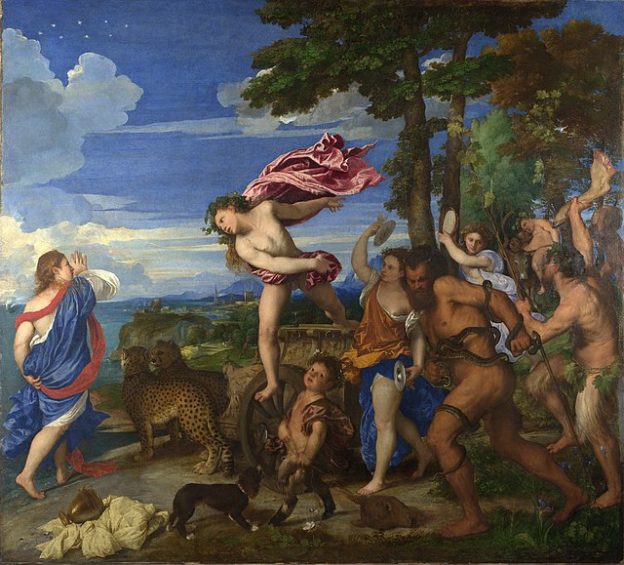
Medea’s story and those of other abandoned or mistreated women from the ancient world are recounted in Ovid’s epistolary work, The Heroides. This set of poems is fascinating, not only because it offers a female perspective (albeit one constructed by Ovid) on familiar stories, but because it shows a similar conflation of agency and disempowerment to that discussed above. Laurel Fulkerson recognises the authorial power of Ovid’s women in telling their own tales, arguing that, in turning their thwarted desires into poetry, the heroines become ‘successful in the same way as other elegiac Augustan poets’.[xx] Medea’s letter opens with a recollection of her former power as she reminds Jason of a time when ‘you came begging for help’ (1-2).[xxi] Ariadne, too, positions herself as an active player in Theseus’ victory over the Minotaur (79-80), and challenges Theseus’ cruel treatment of her, asking: ‘is this the tomb my kindness deserves?’ (150). However, any agency which Ariadne possesses here is coupled with a pervasive sense of her present helplessness and isolation. Now ‘an exile’ (74) from her father’s kingdom, but not able to continue her intended journey without the aid of Theseus, Ariadne remains stranded on an island where she expects ‘wolves to attack and tear my flesh apart’ (91-92). A woman alone, she remains suspended between Athens and Crete.
Further examples of this theme can be found in accounts of Rome’s mythological founding. One central episode of Rome’s early history is the abduction of the Sabine women. The historian Livy records how, snubbed by neighbouring communities as being unworthy after approaching them with offers of marriage, the male fugitives and refugees whom Rome at this time consisted of took a group of Sabine women as their wives by force. In response, the Sabines went to war with Rome, but the women brought an end to the conflict by interposing themselves on the battlefield between their fathers and their new husbands. An uncomfortable account when viewed through a modern lens, the role of the Sabine women here is difficult to interpret. Elizabeth Vandiver has made a convincing argument that the consent of the Sabine women was necessary to give the marriages moral validity, and she therefore attributes a degree of agency to the Sabine women, who become crucial co-founders of the city.[xxii]
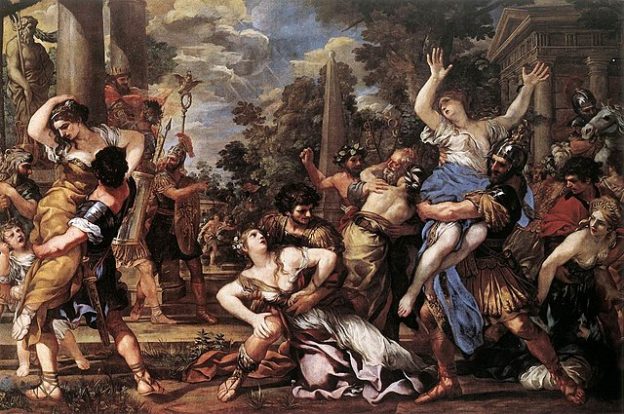
Pietro da Cortona (1627-1629)
For our present purposes, however, it is their initial forceable integration into the Roman community that is the most important part of this narrative.[xxiii] Unlike Rome’s male inhabitants, who come actively to the city of their own accord, women become a part of the community only through the actions of men. Mythological accounts like this can be used to gauge something about the prevailing attitudes of their contemporaries. Women in myth did not gain admittance to a community through independent action (although the Danaids of Aeschylus’ Suppliants may be held up as an exception to this), indicating a belief that this was not an acceptable way for women to join a community.[xxiv] Women who found themselves in the ancient world may have found themselves similarly constrained by patriarchal expectations.
Suggestions for Further Investigation
Despite a social obligation towards the displaced, it is clear that not all suppliants or migrant peoples would be received equally in the ancient world. One’s resources and social standing, or (particularly important to the experiences of women) gendered behavioural expectations which curtailed independent action, could influence how a migrant may be treated. But another factor, deserving of a post of its own, may have also shaped the migrant experience: ethnic or racial identity. Although modern conceptions of racial identity did not exist in the ancient world, evidence does suggest that ethnic origins could impact how migrants were perceived and received by communities.[xxv] Ovid’s Dido, herself a migrant who was (initially) successful in founding a new home, asks Aeneas if, upon reaching the land he seeks, ‘is there one man who would trust a foreigner in his fields?’ (23-24). Although undoubtedly part of a wider rhetoric intended to prevent Aeneas’ departure, Dido’s question appears to point towards a widespread prejudice in which Aeneas’ Trojan identity would limit the welcome he received.
An even more scathing account can be found in Juvenal’s Satire III. As a satirical text, the views which it expresses cannot necessarily be accepted at face value, nor understood as Juvenal’s own beliefs.[xxvi] Nonetheless, the text can offer a very different perspective on migration and on any existing social obligations. The satire’s main speaker, Umbricius, cites as his reason for leaving the city that ‘I can’t stand a Rome full of Greeks’ (61-62), whom he presents as avaricious and false.[xxvii] In Umbricius’ account, the Greeks and their culture are presented as a threat to traditional, Roman ways of living (‘See, Romulus, those rustics of yours wearing Greek slippers, Greek ointments, Greek prize medallions around their necks’ (68-69). Moreover, with its complaint that ‘few of the dregs are Greek’ (61), Umbricius’ tirade also appears to reveal an implicit belief that, as a ‘born-and-bred’ Roman, he is entitled to a certain degree of privilege and success which incoming Greeks do not deserve. The parallels between this and twenty-first century fabrications of the ‘threatening other’ blighting the native culture and ‘stealing’ the jobs of the native inhabitants hardly require further illustration. In light of the centrality of racial discrimination to recent responses towards refugees, it is even more vital that this aspect of ancient literature becomes a topic for further study.
[i] John Gould, ‘Hiketeia’ The Journal of Hellenic Studies 93 (1973), 80-81.
[ii] Victoria Pedrick, ‘Supplication in the Iliad and the Odyssey’, Transactions of the American Philological Association 112 (1982) 125-140, instead stresses context and narrative convenience reasons for differences in depictions of supplication across the poems.
[iii] Quotations from Aeschylus, Persians and Other Plays, trans. Christopher Collard (Oxford: Oxford University Press, 2009).
[iv] See F. S. Naiden, Ancient Supplication (Oxford: Oxford University Press, 2006) and Christopher Auffarth, ‘Protection strangers: establishing a fundamental value in the religions of the ancient near east and ancient Greece’ Numen 39.2, (1992) 193-216.
[v] Elena Isayev, ‘Between hospitality and asylum: a historical perspective on displaced agency’, International Review of the Red Cross99.1 (2017), 78-9.
[vi] Ibid., 83.
[vii] See Mara Mattoscio and Megan C. MacDonald, ‘Introduction: gender, migration and the media’, Feminist Media Studies 18.6 (2018), 1117-1120 for an overview of the role of gender in media depictions of refugees.
[viii] Ibid., 1118.
[ix] Heide Castañeda and Seth M. Holmes, ‘Representing the “European refugee crisis” in Germany and beyond: deservingness and difference, life and death’, American Ethnologist 43.1 (2016), 13.
[x] Quotations from Homer, The Odyssey, trans. Emily Wilson (New York: W. W. Norton & Company, 2018).
[xi] Trans. George Norlin, available at: https://www.perseus.tufts.edu/hopper/text?doc=Perseus%3Atext%3A1999.01.0144%3Aspeech%3D14%3Asection%3D1
[xii] Robert Garland, Wandering Greeks: the ancient Greek diaspora from Homer to the death of Alexander the Great (Princeton: Princeton University Press, 2014), 126, observes that Athens, in Greek tragedy, is depicted as a place of sanctuary for the oppressed.
[xiii] Of course, it should also be noted that the Plataeans are here having to argue for their acceptance into the Athenian community.
[xiv] Trans. E. P. Coleridge, available at: http://www.perseus.tufts.edu/hopper/text?doc=Perseus%3Atext%3A1999.01.0118%3Acard%3D387
[xv] Garland, 2014, 18.
[xvi] Quotations from Euripides, Electra and Other Plays, trans. John Davie (London: Penguin Books, 2004).
[xvii] Gaps such as this are now frequently being addressed by modern retellings. Readers may be interested in Pat Barker’s The Silence of the Girls or Elodie Harper’s The Wolf Den, which attempt to reconstruct the experiences of women of a lower social status in the ancient world.
[xviii] Terence Wright, ‘The media and representations of refugees and other forced migrants’ in Elena Fiddian-Qasmiyeh, Gil Loescher, Katy Long, and Nando Sigona (eds.), The Oxford handbook of refugee and forced migration studies (Oxford: Oxford University Press, 2014),464-465.
[xix] Quotations from Euripides, Medea and Other Plays, trans. John Davie (London: Penguin Books, 2003).
[xx] Laurel Fulkerson, The Ovidian heroine as author: reading, writing and community in the Heroides (Cambridge: Cambridge University Press, 2005), 1-2.
[xxi] Quotations from Ovid, Heroides, trans. Harold Isbell (London: Penguin Books, 2004).
[xxii] Elizabeth Vandiver, ‘The founding mothers of Livy’s Rome: The Sabine women and Lucretia’ in Frances B. Titchener and Richard F. Moorton (eds.), The eye expanded: life and the arts in Greco-Roman antiquity (Berkeley: University of California Press, 1999), 209-214.
[xxiii] Ovid, Fasti 3.201-207 and Ars Amatoria 1.101-102 stress the force employed against the Sabine women.
[xxiv] Parshia Lee-Stecum, ‘Roman refugium: refugee narratives in Augustan versions of Roman prehistory’, Hermathena 184, 2008, 89.
[xxv] Debbie Challis, ‘The ablest race’ in Mark Bradley (ed.), Classics and Imperialism in the British Empire (Oxford: Oxford University Press, 2010), 94-120, discusses the role of classics in the formation of modern racial categorisation.
[xxvi] For a discussion of instances of xenophobia in the work of Juvenal, see https://digilib.phil.muni.cz/bitstream/handle/11222.digilib/141160/1_GraecoLatinaBrunensia_24-2019-1_8.pdf?sequence=1
[xxvii] Trans. A. S. Kline, available at https://www.poetryintranslation.com/PITBR/Latin/JuvenalSatires3.php